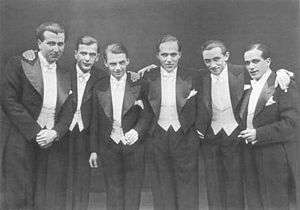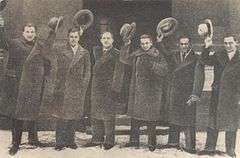Comedian Harmonists

The Comedian Harmonists were an internationally famous, all-male German close harmony ensemble that performed between 1928 and 1934 as one of the most successful musical groups in Europe before World War II. The group consisted of Harry Frommermann (tenor buffo), Asparuh "Ari" Leschnikoff (first tenor), Erich Collin (second tenor), Roman Cycowski (baritone), Robert Biberti (bass), and Erwin Bootz (pianist).
The hallmark of the Comedian Harmonists was its members' ability to blend their voices together so that the individual singers could appear and disappear back into the vocal texture. Its repertoire was wide, ranging from the folk and classical songs arranged by Frommermann to appealing and witty popular songs of the day by writers such as Peter Igelhoff, Werner Richard Heymann and Paul Abraham.
History

In 1927, unemployed actor Harry Frommermann was inspired by The Revelers, a jazz-influenced popular vocal group from the United States, to create a German group of the same format. According to Douglas Friedman's 2010 book The Comedian Harrmonists, in August 1929 both groups appeared on the same bill at the Scala in Berlin and became good friends. Frommermann held auditions in his flat on Stubenrauchstraße 47 in Berlin-Friedenau, and, once the group was assembled, it quickly began rehearsals. After some initial failures, the Harmonists soon found success, becoming popular throughout Europe, visiting the United States, and appearing in 21 films.[1]
The members of the group were:
| Ari Leschnikoff | (1897–1978) | first tenor |
| Erich A. Collin | (1899–1961) | second tenor |
| Harry Frommermann | (1906–1975) | Tenor buffo |
| Roman Cycowski | (1901–1998) | Baritone |
| Robert Biberti | (1902–1985) | Bass |
| Erwin Bootz | (1907–1982) | Pianist |
The group's success continued into the early 1930s, but eventually ran into trouble with the Nazi regime: three of the group members – Frommermann, Collin, and Cycowski – were either Jewish or of Jewish descent, and Bootz had married a Jewish woman. The Nazis progressively made the group's professional life more difficult, initially banning pieces by Jewish composers, and finally prohibiting them from performing in public. The group's last concert in Germany was in Hannover on March 25, 1934 after which they sailed to the United States on SS Europa and gave several concerts. Fearing internment if they stayed abroad, however, they eventually returned home amid bitter internal disputes.

Frommermann, Cycowski, and Collin subsequently fled Germany and formed a new group, which performed under the names "Comedian Harmonists" and "Comedy Harmonists" with a new pianist, bass, and high tenor. The remaining members in Germany likewise replaced their counterparts in a successor group named "Das Meistersextett" (as the authorities forbade an English-language name). Neither group was able to achieve the original success of the Comedian Harmonists, with the German group stifled by political in-fighting and heavy censorship, as well as the war draft (call-up); the emigrant group was unable to find work in America due to hostility to German entertainers, and they were unable to return to Austria, where they had enjoyed extensive success in the 1930s. The Bulgarian Asparuh Leschnikoff (also spelt Leshnikov) returned to his fatherland in 1938 and started a successful career. By 1941, both groups had broken up. Although all members survived the war, they never re-formed after the war.
The group remained largely forgotten until filmmaker Eberhard Fechner created a four-hour black-and-white television documentary, in which he interviewed the surviving members in 1975, who were scattered throughout the world. The documentary aired over two nights in German in 1977 and caused a resurgence of interest in the music of the Comedian Harmonists, with their records being released on vinyl.
They won recognition from the musical entertainment industry in 1998 when they won the Echo Prize from the Deutsche Phonoakademie.
Dramatic representations
They were the subject the 1997 German movie Comedian Harmonists, released in the United States as The Harmonists.[2] In the film, the actors lip synched in the musical performances to the group's original recordings.
The 1997 film directly led to a musical play about the group, Veronika, der Lenz ist da - Die Comedian Harmonists, which opened at the Komödie in Berlin in December 1997. When this production closed, the actors who had played the original sextet formed a new group called the Berlin Comedian Harmonists, which recreates the Comedian Harmonists' repertoire.
Harmony, a musical about the Comedian Harmonists, with music by Barry Manilow and book and lyrics by Bruce Sussman, premiered at the La Jolla Playhouse in the fall of 1997, and recently played at the Alliance Theater in Atlanta on September 6, 2013, to run through October 6, then moved in early 2014 to the Ahmanson Theater in Los Angeles.[3][4]
Discography
- Ah Maria, Mari
- Ali Baba
- An der schönen blauen Donau ("The Blue Danube")
- Auf dem Heuboden ("In the Hayloft")
- Auf Wiedersehen, My Dear ("See You, My Dear")
- Baby
- Barcarole
- Bin kein Hauptmann, bin kein großes Tier ("I'm No Officer, I'm No Hot Shot")
- Blume von Hawaii ("Flower From Hawaii")
- Creole Love Call by Duke Ellington
- Das ist die Liebe der Matrosen ("That's The Sailors' Love")
- Der Onkel Bumba aus Kalumba tanzt nur Rumba ("Uncle Bumba From Kalumba Only Dances The Rumba")
- Die Dorfmusik ("The Village Music")
- Die Liebe kommt, die Liebe geht ("Love Comes, Love Goes")
- Du bist nicht die erste ("You're Not The First One")
- Ein bißchen Leichtsinn kann nicht schaden ("A Little Carelessness Can't Hurt")
- Ein Freund, ein guter Freund ("A Friend, A Good Friend")
- Ein Lied geht um die Welt ("A Song Goes Around The World")
- Ein neuer Frühling wird in die Heimat kommen ("A New Spring Will Come Home")
- Eine kleine Frühlingsweise ("A Little Spring Melody")
- Einmal schafft's jeder ("Everyone Does It Once")
- Eins, zwei, drei und vier, glücklich bin ich nur mit dir ("One, Two, Three And Four, I'm Only Happy When I'm With You")
- Es führt kein and'rer Weg zur Seligkeit ("There's No Other Way to Bliss")
- Florestan 1., Prince De Monaco ("Florestan The First, Prince Of Monaco")
- Fünf-Uhr-Tee Bei Familie Kraus ("Five-O'-Clock-Tea With The Kraus Family")
- Gitarren, spielt auf ("Guitars, Play")
- Guten Tag, gnädige Frau ("Good Day, Madam")
- Guter Mond, du gehst so stille
- Hallo, was machst Du heut', Daisy? ("Hello, Whatcha Doin' Today, Daisy?" from "You're Driving Me Crazy")
- Ich küsse Ihre Hand, Madam ("I Kiss Your Hand Madam")
- In einem kühlen Grunde ("In A Cool Place")
- Irgendwo auf der Welt ("Somewhere In the World")
- Kannst Du pfeifen, Johanna? ("Can you Whistle, Johanna?")
- Mein kleiner grüner Kaktus ("My Little Green Cactus")
- Puppenhochzeit ("Dolls' Wedding")
- Schlafe, mein Prinzchen, schlaf ein ("Sleep, My little Prince, Go To Sleep")
- Schöne Isabella von Kastilien ("Beautiful Isabel from Castile")
- Schöne Lisa, süße Lisa ("Beautiful Lisa, Sweet Lisa")
- Ungarischer Tanz Nr. 5 ("Hungarian Dance No. 5")
- Veronika, der Lenz ist da ("Veronika, Spring is here")
- Wenn die Sonja russisch tanzt ("When Sonja Dances Russian-like")
- Wenn der Wind weht über das Meer ("When The Wind Blows Over The Sea")
- Wenn ich vergnügt bin, muß ich singen ("When I'm Merry, I Must Sing")
- Whispering
- Wir sind von Kopf bis Fuß auf Liebe eingestellt ("Falling in Love Again (Can't Help It)")
- Wochenend und Sonnenschein ("Weekend and Sunshine“) / Happy Days Are Here Again
References
- Etscheit, Ulrich; Metzger, Julian (eds.). Comedian Harmonists. Das Original (in German). Kassel: Bosse. (Sheet music)
- ↑ The Internet Movie Database, http://www.imdb,com%5B%5D
- ↑ The Internet Movie Database, http://www.imdb.com/title/tt0128133/
- ↑ Barry Manilow's Harmony and Maurice Hines' Tappin' Thru Life Will Be Part of 2013-14 Alliance Season in Atlanta, Michael Gioia, March 14, 2013, Playbill
- ↑ Alliance Theater program book September 2013
External links
- English language biography of the group by Douglas E. Friedman
- Comedian Harmonists at the Internet Movie Database
- Works by Comedian Harmonists at Open Library
- Fan page German only, with history, list of concerts, discography
- History and pictures
- Links to audio samples
- Video of modern singers performing the Comedian Harmonists arrangement of "Am Brunnen vor dem Tore"